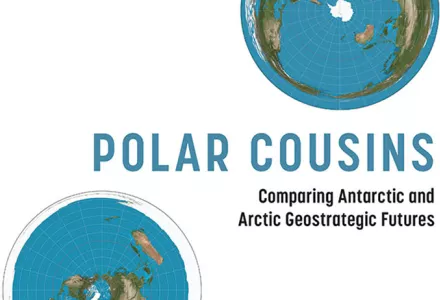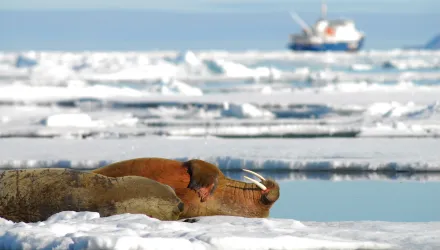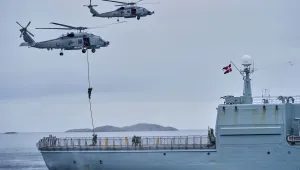
Once considered "flyover country at the edge of the world," the Arctic, the Antarctic, and their associated marine environments are emerging as regions for exploration, exploitation, and extraction - as well as active arenas for geopolitical competition between polar and near-polar states. How that competition plays out will have serious ramifications for environmental, political, economic, and human security and stability around the globe.
The Arctic Initiative hosted a book talk with Douglas Causey, Arctic Initiative Associate and Professor of Biological Sciences at the University of Alaska Anchorage, and Christian Leuprecht, Class of 1965 Professor in Leadership at the Royal Military College of Canada. Drawing from their new book, Polar Cousins: Comparing Antarctic and Arctic Geostrategic Futures, co-editors Causey and Leuprecht discussed the impacts of geopolitics and climate change on national and international security interests in both polar regions, as well as the lessons learned from the Arctic experience for addressing challenges relating to governance, environmental protection, and maritime operations in the Antarctic.
About the Book
A timely exploration of rapidly evolving geopolitical, social, and environmental challenges for national and international security strategy across the Arctic and Antarctic polar regions.
Geopolitics and climate change now have immediate consequences for national and international security interests across the Arctic and Antarctic. The world’s polar regions are contested and strategically central to geopolitical rivalry. At the same time, rapid political, social, and environmental change presents unprecedented challenges for governance, environmental protection, and maritime operations in the regions.
With chapters that raise awareness, address challenges, and inform policy options, Polar Cousins reviews the state of strategic thinking and options on Antarctica and the Southern Oceans in light of experience in the circumpolar North. Prioritizing strategic issues, it provides an essential discussion of geostrategic thinking, strategic policy, and strategy development.
Featuring contributions from international defence experts, scientists, academics, policymakers, and decisionmakers, Polar Cousins offers key insights into the challenges unique to the polar regions.
With contributions by: Brenda Dunkle, Roger Bradbury, Joe Burton, Douglas Causey, Lassi Heininen, Randy “Church” Kee, Ilan Kelman, Timo Koivurova, Peter Layton, Christian Leuprecht, Dwayne Ryan Menzes, Heather Nicol, AJ (Tony) Press, Joanna Vince, and Robin Warner









